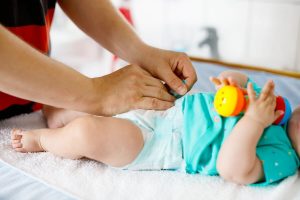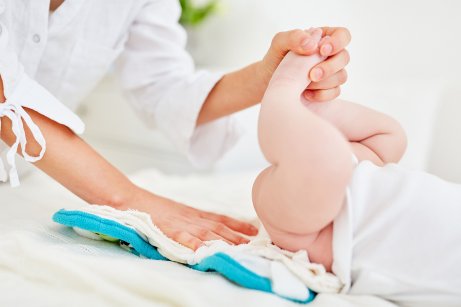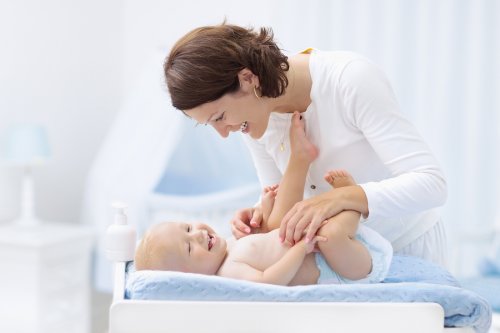When Should You Change Your Baby's Diaper?


Reviewed and approved by the doctor Nelton Ramos
When is it time to change your baby’s diaper?
Something that everybody knows is that you should change your baby’s diaper right away every time he poops. Small babies may even poop immediately after a diaper change, meaning you’ll need to change them again. In general, this occurs after breastfeeding.
However, knowing when to change your little one’s diaper when he or she has urinated can be more difficult to calculate. Every child has a particular rhythm. In general, babies tend to urinate quite often, especially while nursing.
Your best bet is to establish a set moment for changing you baby’s diaper, such as just before or just after feedings.
At the same time, you should always put a clean diaper on your baby just before bedtime. This helps to avoid the accumulation of too much liquid while he or she sleeps.
If you’re going to go out, be sure to bring clean diapers along in case the need for a change arises before you come home.
If your baby suffers from reflux and spits up after feedings, then you should change him or her beforehand. If you do the opposite, and change your baby after feedings, you may provoke more spitting up.
Diaper changes according to your baby’s age
If you have a newborn, you’ll need to change your baby’s diaper quite often. This is due to the fact that newborns eat every two or three hours, and poop often.
At the same time, they pee very often as well. This is because their intake of liquid, breast milk or formula. They’re also very sensitive to temperature, and feeling cold makes them pee constantly.

As babies grow, the amount they pee at one time increases, and the frequency of urinations decreases.
Being so wet can really make little one’s uncomfortable and cause them to cry. Therefore, you need to pay attention to your baby’s signals and change as soon as needed.
If your baby’s diapers stay dry for a long time, you should talk to your doctor. This can be a sign of some sort of anomaly or dehydration.
Why is it important to change your baby’s diapers in a timely manner?
Babies are vulnerable to irritating agents in the diaper region. Therefore, urine and feces that are left over time can cause alteration in your child’s skin.
Urine and fecal matter combined with the rubbing of the diaper can lead to the cultivation of bacteria and fungus. These issues cause irritation, eruptions and infections if left untreated. It’s worth mentioning that some babies are more prone to these problems than others.
Also, keep in mind that diapers can only absorb a certain amount of liquid. Therefore, if your child’s urine exceeds this limit, the diaper will overflow and cause other areas of your child’s body and clothing to become wet. If your child is sleeping, then his or her bed will get wet as well.
“You should always put a clean diaper on your baby just before bedtime. This helps to avoid the accumulation of too much liquid while he or she sleeps.”
Should you change your baby’s diaper while he or she is sleeping?
If your baby is sleeping at night, then it’s best not to change his or her diaper. Doing so may interrupt your little one’s sleep cycle.
However, you can take advantage of nighttime feedings to change your baby – before or after.
That being said, if your baby is sleeping during the daytime and you notice a diaper change is necessary, then it’s okay to wake him or her up.
Do so with music or your gentle voice, and this will help your little one adapt to daylight and daytime.

What should you do during diaper changes?
When diaper changing time comes, you can take advantage of the moment to stimulate your baby’s senses. This means making the occasion fun – singing, talking, playing music, etc. All of this aids in the process of adaptation.
Always keep everything you need for each diaper change in a specific spot and within reach. This includes clean diapers, wipes, ointments and creams, etc.
This way, you won’t get flustered when you have to search for things at each change. In the same way, make sure to bring these items along when you and your baby are out of the house.
Also, it’s important that you use the correct diaper according to your baby’s age and size. Diapers shouldn’t be too big or too small. This will help ensure comfort and avoid chafing and irritation if diapers are too tight.
Diapers that are too big, on the other hand, can lead to leakage. Also, your little one’s diaper may fall down or twist around if it’s too large.
In conclusion, it’s not always easy to determine the right time for diaper changes. However, with this simple guide, you’ll be sure to provide the right care and hygiene that your baby needs, when he or she needs it.
When is it time to change your baby’s diaper?
Something that everybody knows is that you should change your baby’s diaper right away every time he poops. Small babies may even poop immediately after a diaper change, meaning you’ll need to change them again. In general, this occurs after breastfeeding.
However, knowing when to change your little one’s diaper when he or she has urinated can be more difficult to calculate. Every child has a particular rhythm. In general, babies tend to urinate quite often, especially while nursing.
Your best bet is to establish a set moment for changing you baby’s diaper, such as just before or just after feedings.
At the same time, you should always put a clean diaper on your baby just before bedtime. This helps to avoid the accumulation of too much liquid while he or she sleeps.
If you’re going to go out, be sure to bring clean diapers along in case the need for a change arises before you come home.
If your baby suffers from reflux and spits up after feedings, then you should change him or her beforehand. If you do the opposite, and change your baby after feedings, you may provoke more spitting up.
Diaper changes according to your baby’s age
If you have a newborn, you’ll need to change your baby’s diaper quite often. This is due to the fact that newborns eat every two or three hours, and poop often.
At the same time, they pee very often as well. This is because their intake of liquid, breast milk or formula. They’re also very sensitive to temperature, and feeling cold makes them pee constantly.

As babies grow, the amount they pee at one time increases, and the frequency of urinations decreases.
Being so wet can really make little one’s uncomfortable and cause them to cry. Therefore, you need to pay attention to your baby’s signals and change as soon as needed.
If your baby’s diapers stay dry for a long time, you should talk to your doctor. This can be a sign of some sort of anomaly or dehydration.
Why is it important to change your baby’s diapers in a timely manner?
Babies are vulnerable to irritating agents in the diaper region. Therefore, urine and feces that are left over time can cause alteration in your child’s skin.
Urine and fecal matter combined with the rubbing of the diaper can lead to the cultivation of bacteria and fungus. These issues cause irritation, eruptions and infections if left untreated. It’s worth mentioning that some babies are more prone to these problems than others.
Also, keep in mind that diapers can only absorb a certain amount of liquid. Therefore, if your child’s urine exceeds this limit, the diaper will overflow and cause other areas of your child’s body and clothing to become wet. If your child is sleeping, then his or her bed will get wet as well.
“You should always put a clean diaper on your baby just before bedtime. This helps to avoid the accumulation of too much liquid while he or she sleeps.”
Should you change your baby’s diaper while he or she is sleeping?
If your baby is sleeping at night, then it’s best not to change his or her diaper. Doing so may interrupt your little one’s sleep cycle.
However, you can take advantage of nighttime feedings to change your baby – before or after.
That being said, if your baby is sleeping during the daytime and you notice a diaper change is necessary, then it’s okay to wake him or her up.
Do so with music or your gentle voice, and this will help your little one adapt to daylight and daytime.

What should you do during diaper changes?
When diaper changing time comes, you can take advantage of the moment to stimulate your baby’s senses. This means making the occasion fun – singing, talking, playing music, etc. All of this aids in the process of adaptation.
Always keep everything you need for each diaper change in a specific spot and within reach. This includes clean diapers, wipes, ointments and creams, etc.
This way, you won’t get flustered when you have to search for things at each change. In the same way, make sure to bring these items along when you and your baby are out of the house.
Also, it’s important that you use the correct diaper according to your baby’s age and size. Diapers shouldn’t be too big or too small. This will help ensure comfort and avoid chafing and irritation if diapers are too tight.
Diapers that are too big, on the other hand, can lead to leakage. Also, your little one’s diaper may fall down or twist around if it’s too large.
In conclusion, it’s not always easy to determine the right time for diaper changes. However, with this simple guide, you’ll be sure to provide the right care and hygiene that your baby needs, when he or she needs it.
All cited sources were thoroughly reviewed by our team to ensure their quality, reliability, currency, and validity. The bibliography of this article was considered reliable and of academic or scientific accuracy.
- Sugimura T, Tananari Y, Ozaki Y, Maeno Y, Tanaka S, Ito S, Kawano K, Masunaga K. Association between the frequency of disposable diaper changing and urinary tract infection in infants. Clin Pediatr (Phila). 2009 Jan;48(1):18-20.
- Wesner E, Vassantachart JM, Jacob SE. Art of prevention: The importance of proper diapering practices. Int J Womens Dermatol. 2019 Mar 3;5(4):233-234.
This text is provided for informational purposes only and does not replace consultation with a professional. If in doubt, consult your specialist.








